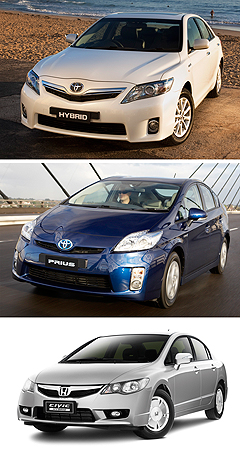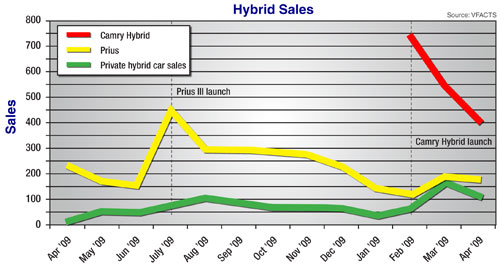News - General News - SalesHybrid: too low for heroStalled: Hybrids such as Toyota's locally-built Camry Hybrid have not exactly hit the spot with consumers. Private buyer interest in hybrid cars remains low, despite locally built eco Camry17 May 2010 By TERRY MARTIN AS MUCH as ever, hybrid passenger vehicles remain on the current and future model programs of most of the world’s car manufacturers. With increasingly stringent emissions regulations now a pervasive part of the motoring landscape, particularly overseas, hybrids are seen as a critical means for car-makers to lower their average carbon dioxide output across their vehicle brands. They are, of course, also a means for car companies to demonstrate environmental leadership, and a potentially lucrative market segment when enough consumers respond to the message. In Australia, hybrid-like features such as automatic idle-stop on otherwise conventional-engine cars are gaining momentum, and the choice of outright hybrid models, while still greatly limited, received a significant boost in February with the long-awaited launch of the Victorian-built Camry Hybrid. Although business sales are driving the current general market boom, and government and rental-car sectors are set to be the major force behind Camry Hybrid sales, it is worth considering how well private Australian consumers have responded to the hybrid message. And the answer is ... with remarkable indifference. VFACTS figures show that Toyota racked up 742 Camry Hybrid sales during its first month on the market (February), which includes fleet and government sales and the company’s own registrations.  From top: Toyota Camry Hybrid, Toyota Prius and Honda Civic Hybrid. From top: Toyota Camry Hybrid, Toyota Prius and Honda Civic Hybrid.That is about the figure the company needs to achieve its goal of 10,000 sales a year of the Camry Hybrid – 40 per cent of which Toyota said should be from private customers – but since then sales dropped off to 548 in March and, worryingly for the company, 396 in April. Of these, the percentage of private sales is difficult to ascertain. But consider that total private hybrid passenger car sales across all models and brands on the market – including the Honda Civic Hybrid, Lexus’ LS and GS hybrid models, and Toyota’s own Prius – were just 66 in February, 161 in March (marking a Camry spike) and then down to 112 in April. With figures like these, there is simply no escaping the lack of private customer interest in hybrid cars. Out of about 291,000 private passenger car sales last year, just 725 were hybrids – down a whopping 49.5 per cent on 2008 and representing a mere 0.25 per cent of total private new-car sales. With the market now back in a boom period, of the almost 107,000 private new-car sales recorded for the first four months of this year, the Camry Hybrid has pushed the total hybrid figure up to 381 YTD. However, 381 still represents only 0.36 per cent of private passenger sales coming from petrol-electric models. While the Camry Hybrid has boosted overall hybrid numbers, the emergence of the Australian-built model looks to be coming at the expense of Toyota’s imported Prius, sales of which were down 23.8 per cent last month (with 179 units) and are currently down 27.4 per cent year to date. Toyota was struggling with Prius sales before the third-generation model was launched in July last year (down 32.2 per cent to June 30), but was confident it would achieve 3500 sales for the full calendar year and a further 4500 in 2010, the latter equating to a monthly sales rate of 375 vehicles. As it turned out, Toyota managed only 3040 Prius sales last year, and is currently averaging 160 sales a month – less than half its forecast number and well down on sales recorded with the old model during difficult economic conditions early last year. While a few potential Prius customers might be turning around in the showroom to Camry Hybrid, others might be driving out in any number of other Toyota models, with sales of the Yaris light car, the venerable Corolla, the regular Camry and the RAV4 compact SUV (to name just a few) all experiencing growth in 2010. With national fuel prices not fluctuating wildly (but remaining reasonably high), and small and compact vehicle segments thriving, private consumers appear to be looking more to conventional-engine cars that offer economical, if not ultra-low-emissions, motoring. Significantly, these are increasingly diesel-powered vehicles which are no longer the domain of medium or large SUVs and light commercials. As momentum shifts in the overall new-car market, the mood towards diesel is also brightening – a fact reflected in sales figures, and also car company marketing activities. Ford in particular has challenged Toyota head-on with claims that its diesel-powered Fiesta light car is more economical than the Prius, and this week the Blue Oval brand – which looks to be a long way from offering a hybrid car in Australia – proclaimed that its upgraded diesel Mondeo due out in the third quarter will offer better mileage than the Camry Hybrid. Ford has sound reasons to be pushing hard against hybrid. As well as not having such a vehicle in its range, sales of diesel-powered passenger cars to private motorists were up 71.3 per cent last month, and YTD are up 56.1 per cent. By comparison, sales of petrol cars to private motorists were up 28.7 per cent in April, to be just 7.8 per cent ahead of 2009 YTD. Diesel still represents only a fraction of total private passenger car sales, but at 7.0 per cent YTD its influence is steadily growing. In difficult trading conditions last year, diesel accounted for 5.75 per cent of all private new-car sales, while in 2008 it was at 6.1 per cent. Back in 2005, you could turn those figures around – private diesel passenger car sales were just 1.6 per cent of the total. Hybrid sales, which in 2005 were also climbing at a phenomenal rate, albeit off an extremely low base, have not had the same good fortune. It seems that when the economic downturn hit in 2008, hybrid sales stalled at the lights – and the automatic restart does not appear to be kicking in like it should as economic conditions improve and even now that Toyota is selling a locally built model aimed squarely at Australian mums and dads.  Read more11th of May 2010  Ford targets Camry hybrid with latest MondeoUpgraded diesel engine for Mondeo allows Ford to extend ‘hybrid-beating’ campaign5th of May 2010  April VFACTS: HiLux heads business car boomCar sales lift by more than a quarter in April as HiLux outsells Commodore, Mazda39th of February 2010  Safety recall for Toyota’s PriusToyota to fix Prius brakes, affecting 400,000 Prius owners – nearly 2400 in Oz8th of February 2010  First drive: Toyota hatches homegrown Camry HybridAustralia's first locally built hybrid, Toyota's Camry Hybrid, opens at nearly $37K |
Click to shareGeneral News articlesResearch General News Motor industry news |
















Facebook Twitter Instagram